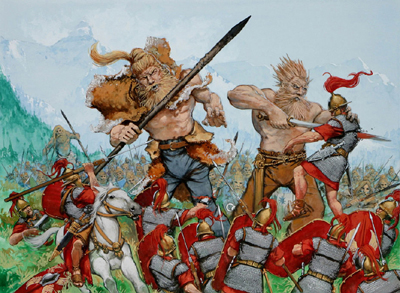El leprechaun es posiblemente el más reconocido de todas las criaturas del “folklore” irlandés. Entonces en el espíritu del día de San Patricia yo les llevo en búsqueda de la identidad verdadera de “las personas pequeñas”. Una palabra de cuidado. El término “personas pequeñas”, es también utilizado para describir personas de estatura muy pequeña como ésos con el enanismo. Ellos no poseen habilidades mágicas. Asi que nunca jamas se debe acechar esas personas. Tampoco recomiendo perseguirles por el oro. Sin embargo, cualquier “persona pequeña”, que se identifica como un leprechaun pues, animate. Bueno, que empezamos la búsqueda en la antigüedad.
El Libro de las Invasiones o Lebor Gabála Érenn (en la lengua céltica) es una colección de literatura antigua que describe la historia de Irlanda desde el principio del los tiempos. Aunque la obra es clasificado por la mayoría de los académicos como un pseudo-historia, dice que los Leprechauns son descendientes de una gente anciana que se llama las Tuatha de Danann que llegaron a bordo de aeronaves y gobernó Irlanda antes de la invasión de las celtas y después forzado a vivir bajo la tierra.
¿Podrían estas cuentas ser simplemente el resultado de una borrachera y una imaginación hiperactiva? Puede ser. Pero la existencia de”gente pequeña” no se limita a Irlanda. De hecho, William Clark, de la expedición de Lewis y Clark anotó algunas en su diario. El partido recibió advertencia de las indígenas que “diablitos”, con grandes cabezas y poderes mágicos eran responsables de una ola de asesinatos recientes. Cuentos similares se retransmiten a nosotros de muchas culturales . Por ejemplo, los Cherokee y la gente indígena de Hawai incluyen cuentas de “la gente pequeña” de sus historias.
Irónicamente, mientras que las representaciones modernas del leprechaun son de duendes con trajes verdes y pelo rojo, los textos antiguos mencionados anteriormente en realidad los describen como gigantes. Aunque esto significa que nuestro leprechaun puede ser más fácil de encontrar, es mejor replantearse antes de robarles el oro. ¿Verdad que si?
Historias de gigantes aparecen en las tradiciones de virtualmente todas las culturas antiguas de la planeta, incluyendo hasta las civilizaciones de sumeria, babilónica, griego, hebreo, maya, azteca, inca, egipto y la india. Ademas, el aspecto super fascinante es como los titanes de la mitología griega, estos gigantes normalmente son los descendientes de los “dioses” o seres del cielo que se mezclaban con los seres humanos. Veamos un ejemplo de la narrativa de inundación bíblica del Génesis, que describe a tal acontecimiento.
Génesis 6:4 dice: “Había gigantes en la tierra en aquellos días, y también después, cuando los hijos de Dios se unieron a las hijas de los hombres y ellas les dieron hijos. Estos son los héroes (valientes) de la antigüedad, hombres de renombre”.
La expresión “hijos de Dios”, cuando se encuentran en el Antiguo Testamento de la biblia santa es siempre una referencia a los ángeles. En este caso los ángeles caídos tenían hijos y se parecen mucho a Hércules. Este tema se repite a lo largo de la historia antigua.
Si tenemos en cuenta que las antiguas historias de gigantes, “la gente pequeña” y los ángeles caídos pueden ser algo más que circunstancia entonces debemos hacer la pregunta, “¿Están todavía aquí estas entidades?”. Antes de descartar esta idea antes de tiempo, recomiendo que miras a la serie de The History Channel titulado Ancient Aliens que se enfoca en la conexión entre las leyendas de antigüedad y modernos encuentros con extraterrestres como el tema central. La adición de más credibilidad a esta teoría es un creciente movimiento de divulgación del conocimiento de extraterrestres (del gobierno de EEUU) y basado en los testimonios de testigos oculares de cientos pilotos, científicos y ex-militares que han tenido tales encuentros.
Bueno, me parece que hemos resuelto el misterio. iLeprechauns son del espacio! Ahora todos pueden descansar cómodamente a sabiendas que mientras que la mayoría de nosotros no estamos viendo muchos duendes irlandeses como los que usted encontrará en Bobby McKees en el día de San Patricia, para creer en “la gente pequeña” es perfectamente razonable.
English
In search of leprechauns
The leprechaun is perhaps the most recognized of all creatures from Irish folklore. So, in the spirit of St. Patrick’s Day, I’m taking you on a quest to uncover the real identity of these mysterious “little people” of legend. A word of caution. The term “little people” is also among the terms used to describe persons of very small stature such as those with dwarfism. They possess no magical abilities and shouldn’t be followed, harassed for gold, asked for wishes to be fulfilled or otherwise confused with a true Leprechaun for this is in very poor taste. However, any “little person” claiming to be a leprechaun is fair game. Now let’s find some Leprechauns!
The Book of Invasions or Lebor Gabála Érenn is an ancient collection of literature describing the history of Ireland from the beginning of time. While considered by most scholars to be pseudo-history, it tells us that Leprechauns are descendants of an older group of people called the Tuatha de Danann who came to Ireland before the invasion of the Celtic tribes. They were said to have arrived aboard flying ships and ruled Ireland before being forced to live underground.
Could these accounts be simply the result of too much whiskey and an overactive imagination? Possibly. But the existence of “little people” isn’t limited to Ireland. In fact, William Clark of the Lewis and Clark expedition made note of them in his journal. He received warnings from the Sioux and other tribes that “little devils” with big heads and magical powers were responsible for a rash of recent killings. Similar tales are relayed to us from people the world over. Cherokee and Hawaiian cultures even include accounts of “little people” in their history.
Ironically, while modern depictions of the leprechaun are of short men with green outfits and red hair, the ancient texts mentioned above actually describe them as giants! While this means they may be easier to find, you should possibly think twice about robbing them of gold.
Stories of giants are featured in the traditions of virtually every ancient culture on the planet, including the Sumerian, Babylonian, Greek, Hebrew, Maya, Aztec, Inca, Egyptian and Indian civilizations. The single most fascinating aspect is that like the titans of Greek mythology, these giants are typically the offspring of ‘gods’ or beings from the sky (space?) and humans. Let’s look at an example from the Biblical flood narrative of Genesis where this appears to be the case.
Genesis 6:4 says: “The Nephilim (giants) were on the earth in those days–and also afterward–when the sons of God went to the daughters of men and had children by them. They were the heroes of old, men of renown.”
The expression “sons of God,” when found in the Old Testament, is always a reference to angels. In this case, they were naughty (fallen) Angels whose offspring sound a lot like Hercules. This theme is repeated throughout ancient history.
If we consider that ancient stories of giants, little people and fallen angels may be more than just coincidence, we should then ask the question, “Are they still here?” Before you dismiss this notion prematurely, consider that The History Channel’s series entitled Ancient Aliens features the connection between these legends and modern encounters with extraterrestrials as the central theme. Adding more credibility to this theory is a growing ET (extra-terrestrial) disclosure movement based on the eyewitness testimony of hundreds of pilots, scientists and former military personnel who have reported such encounters.
Well, it looks like we’ve solved the mystery. Leprechauns are from space! They just enjoy living underground. Now you can all rest comfortably knowing that while most of us aren’t seeing as many Irish Leprechauns like those you’ll find in your local pub on Saint Patty’s Day, believing in “the little people” is perfectly reasonable.














Good article! Think about the interesting and sad progression of these characters in our popular consciousness. These mythical conquerors of Ireland were first worshiped as gods who dwelt mighty fortresses in pagan Ireland, then revered as the small, shy,faerie people who roamed lonely places,then feared by Christian Ireland as mischievous demons, and are finally relegated to obscure memorabilia and mascots. For a great novel on the subject see American Gods by Neil Gaiman.
Comment March 9, 2011 @ 4:48 pm